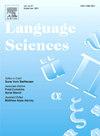从尺寸测量到同时性——以俄罗斯po-mere“通过测量”为例
IF 1.7
2区 文学
Q2 EDUCATION & EDUCATIONAL RESEARCH
引用次数: 0
摘要
本文为越来越多的关于测量名词的文献以及它们容易经历的多方面过程做出了贡献。它突出了俄语介词短语po-mere,litby measure’,最初具有指尺寸测量的组成含义,但已转向作为标记同时性的时间介词的relator函数。本文根据俄罗斯国家语料库的数据,追溯了三个世纪以来新的时态功能的结构变化、巩固及其最终对旧用法的主导地位,揭示了这一发展背后的语法化机制。本文章由计算机程序翻译,如有差异,请以英文原文为准。
From size measurement to simultaneity: the case of Russian po mere ‘by measure’
This paper contributes to the growing body of literature on nouns of measurement and the multifaceted processes that they are susceptible to undergo. It spotlights the Russian prepositional phrase po mere, lit. ‘by measure’, which originally held a compositional meaning referring to size measurement but has shifted towards a relator function as a temporal preposition marking simultaneity. The paper unravels the grammaticalization mechanisms behind this development by tracing across three centuries the constructional change, the entrenchment of the new temporal function and its eventual dominance over the older uses, based on the Russian National Corpus data.
求助全文
通过发布文献求助,成功后即可免费获取论文全文。
去求助
来源期刊

Language Sciences
Multiple-
CiteScore
2.90
自引率
0.00%
发文量
38
期刊介绍:
Language Sciences is a forum for debate, conducted so as to be of interest to the widest possible audience, on conceptual and theoretical issues in the various branches of general linguistics. The journal is also concerned with bringing to linguists attention current thinking about language within disciplines other than linguistics itself; relevant contributions from anthropologists, philosophers, psychologists and sociologists, among others, will be warmly received. In addition, the Editor is particularly keen to encourage the submission of essays on topics in the history and philosophy of language studies, and review articles discussing the import of significant recent works on language and linguistics.
 求助内容:
求助内容: 应助结果提醒方式:
应助结果提醒方式:


